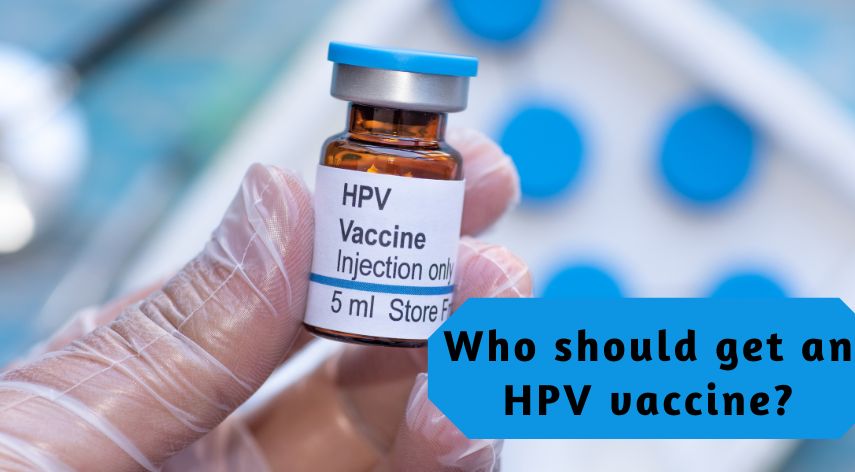Who should get an HPV vaccine?

The HPV vaccine has been recommended for all preteens aged 11 -12 years, including boys and girls. The HPV vaccine is meant to protect them from HPV infections that could lead to cancer later in life. Also, young adults and teenagers through age 26 who did not start or finish the vaccine series should also get vaccinated against HPV. There are several sexual and gynaecology clinics in London where you can get HPV vaccine; however, you can still contact us at the Gynaecology Clinic if you are looking for a good clinic to get HPV vaccine near in London.
The CDC recommends that 11 and 12-year-olds receive two doses of HPV vaccine 6 to 12 months apart. The first dose is routinely administered and recommended for 11 and 12-year-olds, although the series can start at age 9. Additionally, only two doses are recommended if vaccination started at the age of 9 and through the age of 14.
Teens and adults who started the vaccine later, at age 15 – 26, will need three doses of the HPV vaccine. Note that adolescents that started the vaccine series at age 9 to 14 and who have already received two doses of the vaccine less than five months apart will also require a third dose. Finally, it is essential to note that three doses are recommended for people who have a weakened immune system from ages 9 -26.
If you are older than 26, the vaccine is not recommended for you. However, people aged 27 to 45 who have not received the vaccine may decide to get the vaccine after speaking with their doctor about their risks for HPV infections and the possible benefits of vaccine. Know that the HPV vaccine provides less benefit at this age range, as the people may have already been exposed to the HPV.
Table of Contents
ToggleWho should not get the HPV vaccine?
There are certain people who should not get the HPV vaccine. Beforehand, you should speak with your doctor about any allergies you have. Nonetheless, the people who should not get the vaccine include the following;
- People who have an allergy to yeast (Gardasil and Gardasil 9)
- People who are pregnant
- People who have had a life-threatening allergic reaction to any ingredient of any HPV vaccine
For children that are mildly ill, HPV vaccines are safe. People who have a moderate or severe illness should wait until they are better before getting a vaccine.
What are the types of HPV vaccines?
There are three HPV vaccines that have been licensed for administration. These vaccines include;
- 9-valent HPV vaccine (Gardasil 9, 9vHPV)
- Quadrivalent HPV vaccine (Gardasil, 4vHPV)
- Bivalent HPV vaccine (Cervarix, 2vHPV)
These vaccines protect against HPV types 16 and 18, which are the causes of most HPV cancers.
How effective are these vaccines?
HPV vaccines work very well and are very effective. They have the potential to prevent more than 90% of HPV attributed to cancer. Take note of the following factors;
- Fewer teens and young adults are getting genital warts
- Since its first recommendation in 2006, there has been a significant reduction of HPV infections
- The vaccine has reduced the number of cases of pre-cancers of the cervix in young women
- It does not lose the ability to protect against new HPV infections over time
What are the possible side effects of the vaccine?
Like most vaccines, there are side effects to the HPV vaccine. Although some people who get the vaccine do not experience any side effects, others report having very mild side effects like a sore arm from the shot. Some other side effects include the following;
- Fever
- Pain, redness, or swelling in the arm at the injection point
- Nausea
- Muscle or joint pain
- Headache
- Constant feeling of tiredness
There have been reports of brief fainting spells or other related symptoms such as jerking after the vaccination. Sitting or lying down when getting the shot and staying that way for about 15 minutes can help prevent fainting. On infrequent occasions, severe allergic reactions may occur after vaccination.
Where can one find these vaccines?
The HPV vaccine may be available at private doctor offices, school-based health centres, health departments and community health clinics. If the vaccines are not available at these points, try contacting us at Gynaecology Clinic for a private HPV vaccine.
How do I pay for the vaccines?
The Vaccines for Children (VFC) program helps families of eligible children who may not have access to these vaccines. The vaccines are provided by the program at no cost to children aged 18 or younger who are uninsured. Also, contact us to find out more about HPV vaccine in UK cost and payment options. Reach out to us via email or over the phone for more information.
Recommended For You
Spread the loveSexual health is an essential aspect of personal well-being. If you’re based in London and need STI testing,
Spread the loveIn today’s fast-paced world, managing your health effectively is more important than ever – especially for those of
Spread the loveThe EGFR blood test is an important way to check how well the kidneys are working. It checks



